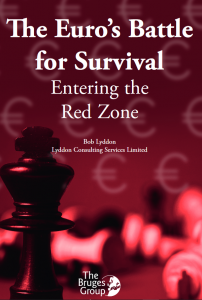
Published on 18 May 2018
We have had a paper published by Bruges Group setting out the extreme difficulties in which the Eurozone finds itself, after years of economic stimulus totalling over 3% of GDP per annum and the build-up of both the ECB’s Asset Purchase Programmes and the loans within the TARGET2 system.
These imbalances are insoluble, and there is a big bullet to dodge: the treaty obligation on each Member State to reduce its national debt:GDP ratio to 60% by 2030.
Several Member States are not yet even in fiscal surplus, let alone on a compliance trajectory, and they cannot turn their situation around without shrinking GDP and making compliance even harder to reach.
There is only one pathway available, which is the completion of Monetary Union, via a series of ultimata given to the other EU Member States:
- forcing all non-Eurozone Member States into the Euro;
- converting the Eurosystem into a legal person and the National Central Banks into its branches;
- installing an EU-wide Bank Deposit Insurance System;
- transference of Member State government debts onto the legal person of the European Union, meaning they become the joint-and-several liability of all Member States.
It is that or risk a total economic collapse. No pressure, then.
This is really why Brexit was an inevitability at the point where the European authorities had either to admit failure or engage in this “Flucht nach vorne”, a German phrase for which we have no direct equivalent – it is a “panic advance”.
That the UK in effect foresaw what was going to happen and decided to leave before being given an ultimatum is all to our credit: coincidentally Brexit provides the European authorities with a cloaking device to conceal the underlying failure of the European project and bounce Europe’s citizenry into its full completion.
Arguably the UK stepped off the Euro bus on Black Wednesday in 1992, but has been riven with controversy ever since as to whether to get off and stay off, or to maintain one foot on it to keep trade going and one foot off as regards mitigating the detriments of integrationist policies we had no stake in.
That mitigation has itself been a failure; we have had to accept high payments, a steady stream of onerous regulation, an influx of over 3 million EU economic migrants, and a plundering of our corporate tax base by the same multinationals – out of their profit-shifting bases in Ireland, Luxembourg and the Netherlands – that seem to so much have the ear of the UK’s Brexit negotiating team through their pressure group the Confederation of British Industry and its supporter in the Cabinet the Chancellor of the Exchequer.
The major worry is whether the Brexit deal that is being worked out between the UK government and the European Commission and member states is a prolongation of the one foot on/one foot off arrangement we have had since 1992, or is the clear break that the UK population voted for, once they had been given the chance.
Those in favour of trade links will be happy to have kept the UK’s foot on the bus. It is another matter how they will explain away to the UK population firstly the acceptance of a continuation of the detriments that is the price of access, and secondly the direct fall-out on the UK deriving from our remaining closely aligned with an organisation that is in the Red Zone for the reasons explained in the paper.
There had better be no fall-out on the UK, either from the measures needed for the Euro to survive, or from the Euro’s collapse if that is what occurs.
